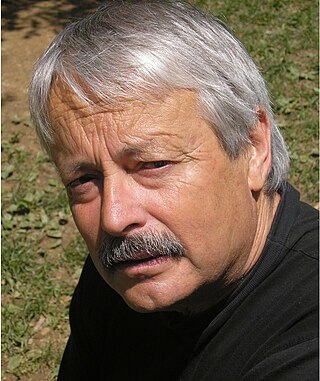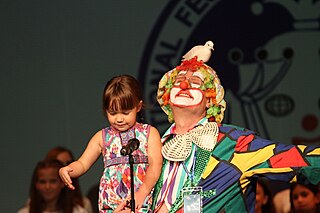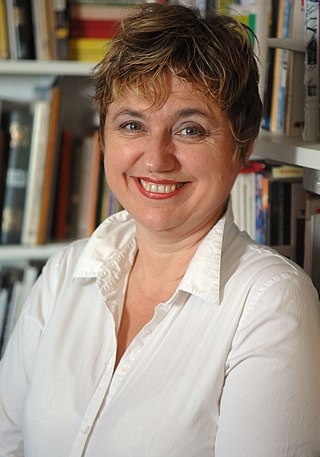
Mira Furlan was a Croatian-American actress and singer. Internationally, she was best known for her roles as the Minbari Ambassador Delenn in the science fiction television series Babylon 5 (1993–1998), and as Danielle Rousseau in Lost (2004–2010), and also appeared in multiple award-winning films such as When Father Was Away on Business (1985) and The Abandoned (2010).

Rade Šerbedžija is a Croatian actor, director and musician. He is known for his portrayals of imposing figures on both sides of the law. He was one of the best known Yugoslav actors in the 1970s and 1980s. He is internationally known mainly for his role as Boris the Blade in Snatch (2000), his supporting roles in such Hollywood films as The Saint (1997), Eyes Wide Shut (1999), Mission: Impossible 2 (2000), X-Men: First Class (2011), Harry Potter and the Deathly Hallows: Part 1 (2010), and Taken 2 (2012); and for his recurring role as former Soviet Army General Dmitri Gredenko in Season 6 of TV action series 24.

The Croatian National Theatre in Zagreb, commonly referred to as HNK Zagreb, is a theatre, opera and ballet house located in Zagreb.

Slobodan Šnajder is a Croatian writer and publicist.
The Great Jones Repertory Company is the Repertory Company of La MaMa Experimental Theatre Club in the East Village of Manhattan, New York City.

The Subotica International Festival of Children's Theatres is an international festival dedicated to children's theatre.
Tomi Janežič is a Slovenian theatre director, professor at the Academy for Theatre, Radio, Film, and Television (AGRFT) in Ljubljana, Slovenia, and a psychodrama psychotherapist. He is also one of the founders and the artistic director of the Studio for Research on the Art of Acting which runs its activities mostly at Krušče Workcenter for Artistic Research, Creation, Residency and Education in Krušče, Slovenia.

Fine Dead Girls is a 2002 Croatian drama film that premiered in July 2002, at the Pula Film Festival. The film has been named one of the best Croatian films since Croatia's independence. It caught much attention due to its controversial, provocative themes.
Rene Maurin is a Slovene theatre director, film director and screenwriter.
The Slovenian Youth Theatre or Mladinsko Theatre was founded in Ljubljana in 1955 as the first professional theater for children and youth in Slovenia. It is situated in the Baraga Seminary, which was built by architect Jože Plečnik in the center of Ljubljana. In the 1980s, it became a center of theatrical research and politically-engaged theater. It is known for a wide range of innovative poetics of different directors and an ensemble energy, a Peter Brook-like approach to acting with a laboratory for theatre research for actors, directors, choreographers and musicians to research, develop, and create.

Tamara Obrovac, Croatian singer, composer, songwriter and flutist is one of the most impressive artists on the Croatian music scene, her main expression is ethnically inspired contemporary jazz influenced by the particular musical and dialect traditions of her homeland, the Croatian peninsula of Istria.
Ivor Martinić is a Croatian playwright and screenwriter.

Branko Gavella was a Croatian theatre director, critic and essayist.
Edward Clug is a choreographer in the field of contemporary ballet born in Romania.
Pece Trajkovski – Brada is a Macedonian musician. He is the lead accordion / guitar / synth player and co-author of the band Foltin since 1999. As a Foltin member, so far, Brada worked on 10 studio albums, music for over 20 theater pieces, several film scores and plenty of live performances on festivals, events, clubs etc.

Sanja Nikčević is a Croatian theatre critic and distinguished professor of theatre history in the drama department of the Arts Academy of Osijek, Croatia. She is also head of the drama module of the doctoral program in literature at the Faculty of Philosophy, University of Osijek. She is the president of the Croatian Critics' Association and Governing Board of Matica hrvatska. Nikčević lives in Zagreb, Croatia.

Pascal Rambert is a French writer, choreographer, and director for the stage and screen. He was born in 1962.
Uglješa Šajtinac is a Serbian writer and playwright.
Darko Lukić is a Croatian theatre scholar, writer, cultural theorist and playwright living and working in Germany. As an expert in multi-disciplinary expert pool for capacity building for European Capitals of Culture worked at audience development program ADESTE+. and Rijeka, European capital of Culture 2020. Lukić also publishes scientific papers and participates in international conferences and seminars and translates from English and Spanish language. He is the member of Programme Board of Maribor 2012, European Capital of Culture 2012. He was a member of the European jury of theatrologists for “Premio Europa per il teatro” award (2009), member of the jury for “Marko Fotez” theatre award of HAZU (Croatian Academy of Science and Arts, president of the Board of Gavella Theatre, editor in Hrvatsko glumište magazine HDDU, artistic advisor of HAVC, Hrvatski audiovizualni centar, artistic advisor of Ministry of Culture - Ministarstvo kulture RH and HRT for film, member of the Cultural Council for Performing Arts of Croatian Ministry of Culture, president of the Theatre Committee of the City of Zagreb, member of the Council for International Cultural Cooperation of the City of Zagreb, and President of the Cultural Council for International Cooperation Ministry of Culture - Ministarstvo kulture RH, and member of Croatian centre of PEN International, member of IETM, CAE, ENCATC, Memory Studies Association, IFTR and EASTAP.

Theatre in Croatia refers to the history of the performing arts in Croatia, or theatrical performances written, acted and produced by Croatians. Croatian theatre generally falls into the Western theatre tradition, with influences especially from Italy, Germany, Austria and other European nations.











